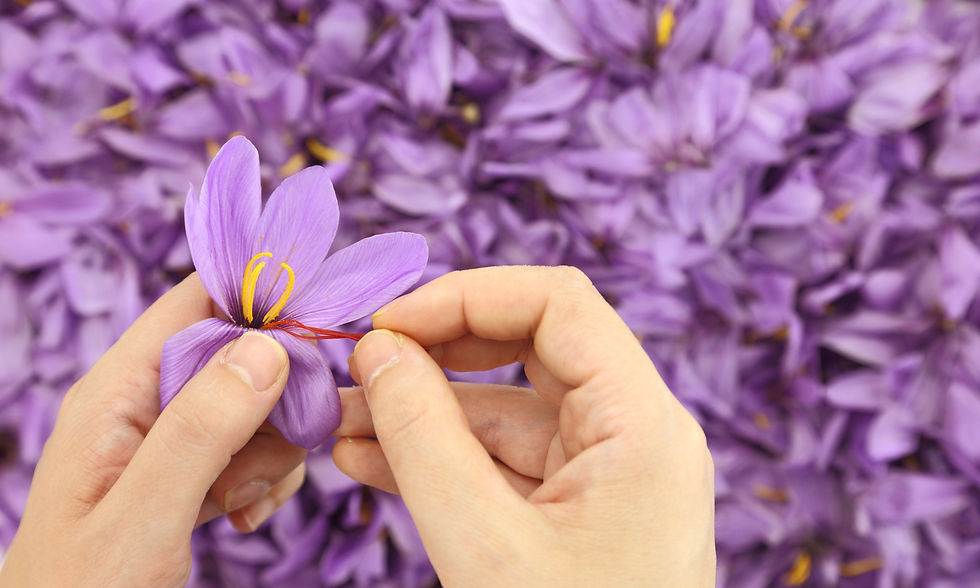Saffron's Role in Traditional Medicine: Historical and Modern Uses
- Siya Behrani

- Feb 3, 2024
- 3 min read
Saffron, known scientifically as Crocus sativus, is not only a prized culinary ingredient but also a significant medicinal herb in various traditional medicine systems across the world. Revered for its vibrant color, distinctive flavor, and therapeutic properties, saffron has been a part of human history for over 3,500 years. This blog explores the historical and modern uses of saffron in Ayurveda, as well as other traditional medicine systems, highlighting its importance not just in kitchens but also in medicine cabinets.
Historical Significance of Saffron
Saffron's use in medicine dates back to ancient civilizations, including the Greeks, Romans, Egyptians, and Persians, who utilized it for its purported healing properties. Ancient medical texts, including those by Hippocrates, discuss saffron as a treatment for everything from gastrointestinal troubles to skin conditions and sleep disorders. In traditional Persian medicine, saffron was a staple for treating depression and enhancing heart health.
Saffron in Ayurveda
Ayurveda, the traditional Indian system of medicine, holds saffron in high esteem for its potent rasayana (rejuvenative) properties. It is classified as a tridoshic spice, meaning it can balance all three doshas (Vata, Pitta, and Kapha), though it is particularly beneficial for pacifying Pitta due to its cooling properties.
Key Uses in Ayurveda:
Mental Health: Saffron is used to improve mood and treat mild to moderate depression. Its soothing properties are said to calm the mind and promote a sense of well-being.
Digestive Health: It is used to stimulate digestion, relieve gas, and treat acidity. Saffron's anti-inflammatory properties are also beneficial in soothing the gastrointestinal tract.
Heart Health: Ayurveda recommends saffron for its ability to strengthen the heart and improve circulation, thanks to its antioxidant content.
Women’s Health: Saffron has been traditionally used to support women's health, including easing menstrual cramps and promoting fertility.
Skin Health: Topically, saffron is applied in various formulations to enhance skin brightness, clear complexion, and treat acne.
Saffron in Other Traditional Medicine Systems
Traditional Chinese Medicine (TCM)
In TCM, saffron is used to move qi (vital energy) and blood, treating conditions related to blood stasis and qi stagnation, such as menstrual irregularities and abdominal pain. It is also valued for its ability to "cool the blood" and reduce inflammation.
Unani Medicine
Unani medicine, which has its roots in Greek philosophy, uses saffron to balance the four humors of the body. It is prescribed for its antidepressant and anti-inflammatory properties, and as a tonic to improve vitality and stamina.
Modern Research and Uses
Contemporary research supports many of saffron's traditional uses, particularly its effectiveness in treating depression and protecting against heart disease. Studies have found that saffron's active compounds, including crocin, crocetin, and safranal, have potent antioxidant, anti-inflammatory, and neuroprotective properties. This has led to increased interest in saffron as a natural alternative for managing various health conditions, from mood disorders to metabolic syndrome.
Safety and Dosage
While saffron is generally safe for most people, excessive consumption can have harmful effects, including dry mouth, dizziness, and nausea. Pregnant women are advised to use saffron cautiously as it can stimulate the uterus. It's essential to consult with a healthcare provider or a qualified practitioner of traditional medicine to determine the appropriate dosage and usage for individual health needs.
Conclusion
Saffron's role in traditional medicine is a testament to its enduring value as a natural remedy. From Ayurveda to modern pharmacology, saffron continues to be a subject of interest for its health-promoting benefits. Whether used to enhance mood, support digestion, or improve heart health, saffron exemplifies the power of natural substances in maintaining and restoring health, bridging the gap between ancient wisdom and contemporary science.




Comments